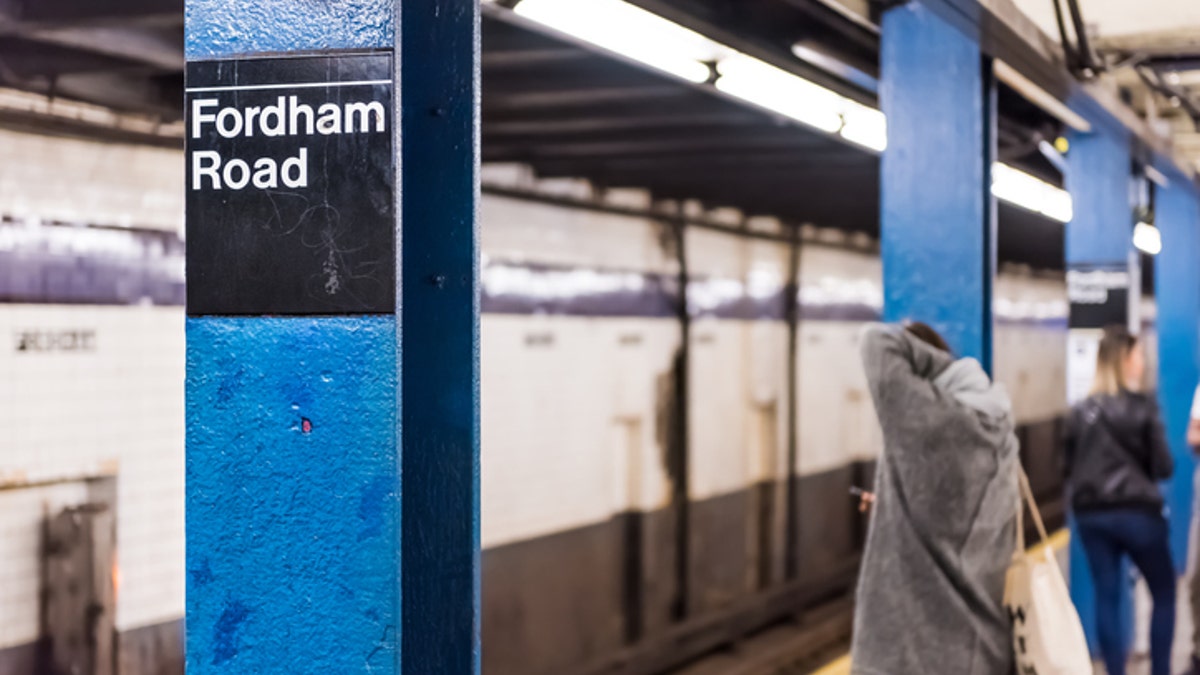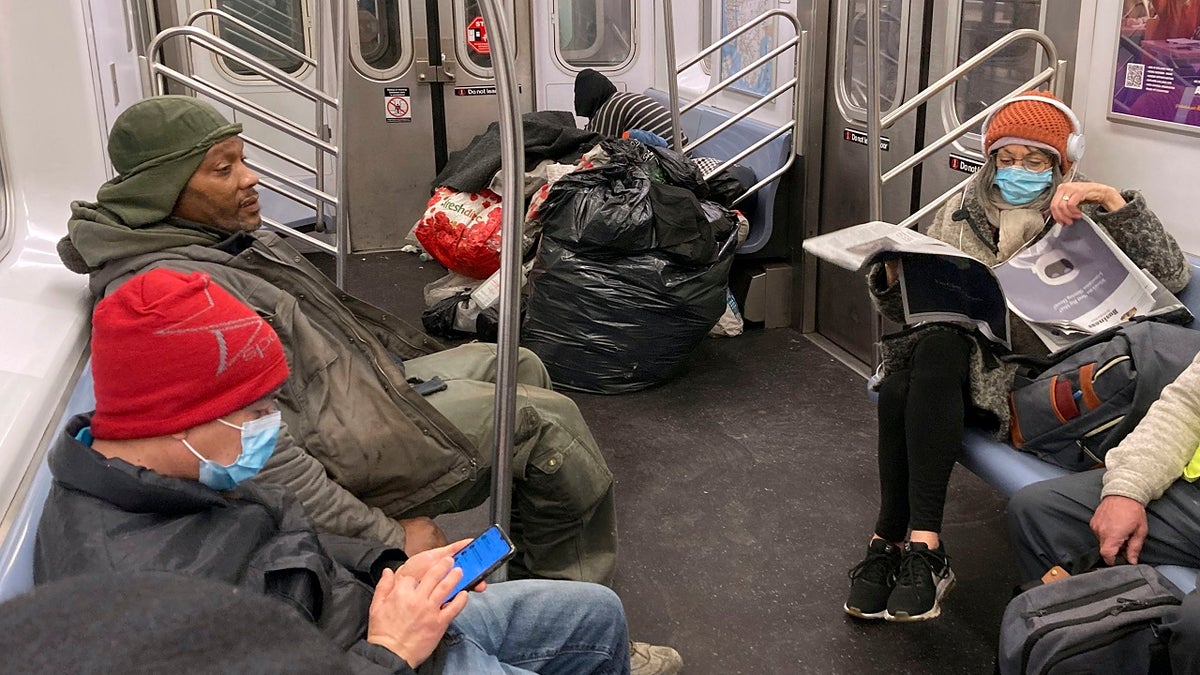New York City Mayor Eric Adams’s subway enforcement plan took effect Monday, on the heels of a violent weekend with six stabbings and two other violent assaults reported in the transit system as of Monday morning.
The Big Apple mayor announced Friday his plans to revamp the subway system’s safety and security practices with a seemingly zero-tolerance program aimed at providing services to homeless individuals and those experiencing mental health difficulties, and targeting loiterers, turnstile-jumpers and criminal opportunists. Violence unfolded in the subway system just hours later, with six people stabbed or slashed and two attacked with other dangerous objects from Friday night through early Monday, the New York Police Department (NYPD) said.
NYC MAYOR ERIC ADAMS SUBWAY SAFETY PLANS CALLS FOR OUTREACH WORKERS, INCLUDING SCHOOL NURSES
SUBWAY VIOLENCE
In the first incident, a 31-year-old man was riding a southbound No. 1 train through Manhattan’s Morningside Heights around 8:30 p.m. Friday when he asked another man to stop smoking, police said.
The stranger allegedly responded by pulling out a knife and stabbing the man in his left forearm before he left the subway at the 116th Street and Columbia University subway station, police said. Medics took the victim to an area hospital and he was expected to survive. His attacker is still on the loose.
Saturday morning, a 45-year-old man was leaving a Queens subway station around 3 a.m. when three male strangers "grabbed him and demanded his property," police said. One of the attackers then pulled out a knife and stabbed the man several times in his lower body, cops said. They ran off empty-handed and the victim was transported to a nearby hospital.
NYC MAN CHARGED IN BRUTAL MUGGING OF THAI MODEL HAS EXTENSIVE ARREST RECORD
Around 3 p.m. Saturday in Brooklyn, a man allegedly punched a 20-year-old woman in the head and stabbed her three times in the stomach while inside the Van Siclen subway station. He then hopped on a southbound No. 3 train, cops said. The victim was taken to a local hospital in fair condition.
Minutes later, a 74-year-old man was inside a northbound No. 2 train in the Bronx when he and two women who were smoking began arguing, the NYPD said. The women "attacked" him at about 3:22 p.m., with one slashing him in the face and the other pushing him to the ground, police said. They then allegedly took his cell phone.
Police ultimately arrested two teenagers – ages 16 and 19 – and charged both with robbery, assault, criminal possession of a weapon and criminal possession of a controlled substance, cops said.
Later that day, a man, 24, was leaving a Washington Heights subway station around 8:05 p.m. when two men walked up, grabbed him and ordered him to hand over his belongings, police said. That’s when one of the suspects allegedly flashed a knife and stabbed the victim in his right leg. The pair ran off with his wallet and cell phone.
The victim suffered a cut but declined to be taken to the hospital.
Then, a 31-year-old man was riding the southbound No. 6 train in Lower Manhattan around 6:10 p.m. Sunday when he was stabbed in his back and arm in what police have called an unprovoked attacked, police said. He was expected to survive the attack.
Violence in the subway system continued into Monday morning, beginning just 30 minutes after midnight.
A man, 42, was standing on the platform inside a Brooklyn subway station when he spotted a man looking at him and asked him why he was staring, the NYPD said. That’s when the 58-year-old suspect took a hatchet from out of his jacket and charged at the man, swinging the weapon at him in the process, police said.
The victim was able to step out from his attacker’s path. The suspect, Robert Griffith, was arrested at the scene and was found to also have been carrying a screwdriver and a punch dagger, police said. He was hit with several charges, including attempted assault and criminal possession of a weapon.
And just over two hours later, a woman was riding a southbound No. 4 train through the Bronx with a friend around 2:40 a.m. when an apparently homeless man ordered them to stop talking. They continued chatting, at which point he hit the woman in the face with a "small metal pipe," police said.
A Fox News Digital photographer canvassed the New York City subway system on Monday. Photographs appeared to show straphangers brazenly jumping over the turnstiles instead of paying their fares, and sprawled out inside the subway car.
In a video obtained by Fox News Digital, one man can be seen opening the emergency exit door and walking through without paying.
ZERO TOLERANCE
Mayor Adams unveiled his "Subway Safety Plan" on Friday flanked by local and elected officials, including Gov. Kathy Hochul. Speaking to reporters inside Lower Manhattan’s Fulton Transit Center, Adams recalled how the subway system was most dangerous in the 1980s.
"Many of us feel – and the numbers are saying – we are back again, and it’s imperative we have the right response," Adams said.
He added that riders were "deeply concerned."
"We hear it all the time," he said. "I hear it every time I’m on the subway system – people tell me about their fear of using the system, and we’re going to ensure that fear is not New York’s reality."
His administration’s "Subway Safety Plan" will deploy 30 joint response teams to do direct outreach for the homeless and those suffering from mental illness in the subways, according to a press release.
The policy takes a zero-tolerance approach to certain facets of the subway system, such as "end of the line" exits. Under the plan, the city will require every person riding the subway to exit at the train’s final stop. Homeless individuals who exit at the end of the line will be greeted by the "end of the line" teams that will offer support.

FILE - The Fordham Road subway station in the Bronx (iStock)
"The train is at the end of the line. Someone is on there with shopping carts, clothing bags, sleeping, unkept – that's not existing anymore. Just not going to happen. They would prevent people from riding the trains back and forth all night as though we don't see them," Adams continued. "Going forward. We will no longer give an option to exist in this system."
The plan further describes how New Yorkers will continue to see "an increased presence of NYPD officers in subway cars and on platforms" as part of the city’s plans announced in January to deploy more than 1,000 more officers to the subway system.
NYC MAN WHO RANDOMLY PUNCHED 4-YEAR-OLD IN TIMES SQUARE TAKEN DOWN BY MOM: POLICE
Each officer, the plan says, now has a "clear mandate" to enforce certain rules of conduct, and will receive additional training regarding the rules before being deployed.

People ride the subway, in New York, on Jan. 28, 2022. (AP Photo/Ted Shaffrey, File)
The rules include prohibiting people from "lying down, sleeping or outstretching" in the subway, "creating an unsanitary environment," showing aggressive behavior, smoking or using drugs and using the subway for any reason other than for transportation.
During his Friday speech, Adams said he thought it was "a big mistake not enforcing fare evasion" – something that was also seen during the mid-1980s. He said he would be sharing his thoughts with the city’s district attorneys during their next meeting.
VIOLENT ATTACKS CONTINUE ON NYC SUBWAY, 2 PEOPLE STABBED IN 30-MINUTE SPAN
"It sends the wrong message that someone is not going to pay their fare," he said. "And it's just it does not create the environment that we need."
Speaking to Fox News Digital on Friday, an NYPD detective who asked to remain anonymous said he believed the plan was ill-conceived.
"We don’t have enough manpower to do this," he said. "The subways are too big and there aren’t enough cops."
CLICK HERE TO GET THE FOX NEWS APP
He added that it puts police in the position of providing security for clinicians. "Now the officer has to worry not only about himself but the safety of the outreach workers with them," he said.

























